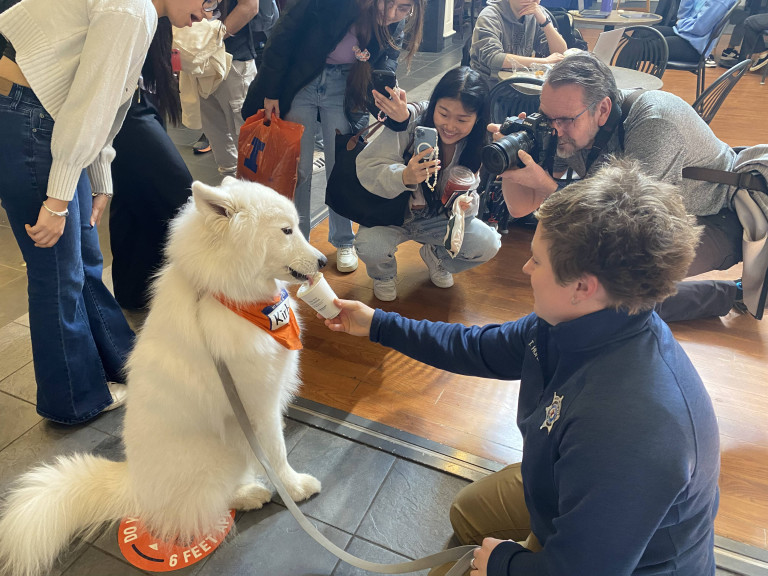University of Illinois looks to pair more police and social workers in co-responder program

Detective Tara Hurless gives a pup cup to therapy K9 Kirby in the Illini Union on March 1. The REACH program uses therapy dogs in community events as part of an effort to focus on mental health. Photo by Elissa Eaton
The University of Illinois Campus police are looking to expand their Response, Evaluation and Crisis Help, or REACH team, to address mental health crises calls.
The REACH team includes a co-responder model that consists of a social worker and a police officer as a single patrol unit.
There has been an incentive to expand the REACH team due to an increase in crisis calls from people on the U of I campus, said Officer Mike Mitrou, a therapy K9 handler.
Mitrou said campus police witnessed an increase in the number of crisis calls over the past two years.
“In 2021, we actually had 149 crisis calls,” Mitrou said. “In 2022, it jumped to 235. And then just so far, in January, there were 27.”
If the number of crisis calls is similar to January, then there will continue to be an increasing number of calls in 2023 compared to previous years, Mitrou said.
“For most of January, the students weren't even here yet, so I mean, if the numbers stay consistent with 27 a month, I mean, that's going to just catapult the numbers from the previous years,” he said.
Although the volume of crisis calls appears to be getting larger, Mitrou said that it could be largely because the REACH team is getting better at recognizing them due to the addition of a social worker’s perspective.
“We're now able to analyze that some of these calls are mental-health related, where in the past, an officer might not have been able to determine that because their training and experience is different,” Mitrou said.
Amanda Brockway, a crisis responder with a master’s in social work, said the REACH program allows for immediate clinical attention at the scene of the crisis, which can prevent unneeded incarcerations and hospitalizations.
“We are right in the heart of the crisis,” Brockway said. “That's how, you know, we're kind of able to de-escalate and prevent a lot of situations from happening.”
For social workers to be able to help on the scene of a crisis, Brockway said they must be kept safe. She said she feels safe while working alongside police officers.
“With our co-responder model, it definitely allows myself as a social worker to feel safe on scene because Mike and the other officers, they always make sure that the scene is safe first before I go in,” Brockway said.
The efforts of the REACH team have been tremendously successful for the UI campus police department, according to Brockway.
Many other police departments have or are looking to implement similar programs Brockway said.
“We've noticed that a lot of neighboring police departments in our area, and even all over the state and country are wanting to incorporate more of this co-responder model,” she said. “A lot of different communities are wanting to incorporate this type of program because they’ve seen the success of it.”
Brockway said the REACH team is looking to hire another social worker, and its team members hope to eventually have 24/7 coverage of campus-related mental health crises.

